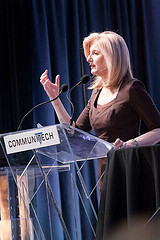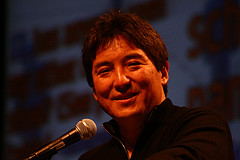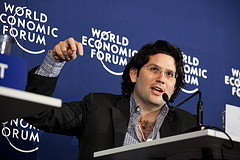
24 leaders give recent graduates their best advice
The working environment in which the graduates are currently entering does not seem too promising. Students fear entering a job market that doesn't need them and losing key years of their careers.
Great advice is needed more than ever. In his latest "Influencers series" on LinkedIn, he asked more than 70 Fortune 500 professionals, CEOs and media icons what 2013 graduates need to succeed.
Here, some share their forewords, while others post thoughts they wish they had known before starting their own careers.
They explain how to build their own company or how to overcome constant rejection by employers, because they went through it themselves and clearly succeeded.
Jim Kim, President of the World Bank
“I'm sure most of you are worried about what the future holds. I just want to tell you today that your future is not only uncertain, it is very likely far more uncertain than you think.
Uncertainty means that nothing is predetermined. Uncertainty means that you can shape the future - with the help of will, intellect and compassion. Uncertainty is freedom. Use that freedom and soar on its wings. And make sure you refuel with grape sugar along the way.”
Part of the introductory foreword delivered at Northeastern University in Boston in May 2013.
Richard Branson, founder of the Virgin Group
"The best advice I can give to any graduate is to spend time on what you are passionate about. If your degree was focused on a certain area, don't let that be a reason not to go in a different direction. If college didn't suit you, don't let that discourage you.
You may decide to take a break and consider your options. I would encourage you to travel; gain new experiences and draw on them before making the decisions that will shape your future. The amount of business ideas people get while traveling is astounding.
Arianna Huffington, president and editor-in-chief at Huffington Post Media Group

Photo Credit: Communitech Photos via Compfight cc
“Commencement speakers are usually expected to tell graduates how to get out there and climb the ladder of success, but instead, I want you to redefine success. Because the world you're heading for absolutely needs it. What I am urging you to do is not just to occupy a place at the top of the world, but to change it.
It is time to create a third dimension - above money and power - that is, one based on well-being, wisdom, the ability to care and give back. Money and power are just a two-legged stool - you can balance on it for a while, but eventually you will fall. And more and more people, very successful people, fall. Success as we defined it is no longer sustainable. It is neither sustainable for human beings nor for societies.
Part of the commencement address delivered at Smith College in May 2013.
Jeff Immelt, Chairman and CEO of GE
"Successful in the 21st century will be those who can get ahead of trends, move quickly, innovate and collaborate to create results. Our ability to contribute to the century in which we live will rest only on our willingness and ability to do five things: change, learn, risk, persist and lead.
We cannot wait for the economy to stabilize. We cannot wait for a time when there will be more certainty. In the past it was enough to dominate the moment, today we have to create our own future. And that means change.
Part of the commencement address delivered at the University of Connecticut's Graduate School in May 2013.
Jacki Zahner, CEO of Women Moving Millions
“Whatever career path or amount of responsibility you choose, make the commitment and learn everything you need to do your job well. If you have the opportunity to jump into something new, jump. Before you do this, find out who your boss will be and make sure he is sympathetic to your future development. Be in touch with your values and follow them in your work.
Finally, be thoughtful and confident, this will lead you to the career you should pursue, whatever that may be. Add to all this a touch of superheroism: what it means to care and care about others. Maintain the highest possible standard. When you follow this, I promise you that success will be inevitable.
Scott Belsky, Co-Founder and Head of Behance, VP Products - Adobe Community
"We are obsessed with the present tense. We want information in real time - everything to the minute - just because we can... By doing this, we are constantly tuning in to the wave of events that happen to others and we are less and less aware of what is happening to us. If I go to the extreme, I would say that the loss of presence is our greatest obstacle in the present when it comes to the life we strive for. But on the other hand, meeting this 21st century challenge may be the most important thing. Your greatest opportunity for personal and professional success will be the ability to make the most of the present - the here and now - in a world of constant connection and overwhelming input.
Ester Dyson, Chair in HICCup
"I always tried to take unpaid jobs. After one at Forbes, I spent five years learning the ins and outs of Wall Street as a securities analyst. When I felt like I understood trading, I left. For me, companies were much more interesting than their stock movements. Despite the lower salary, I joined Ben Rosen, also a former Wall Street analyst, who ran a newsletter and organized conferences focused on the burgeoning personal computer market.
When thinking about your own career, don't think so much about what you want to do, but rather about what you can learn. For example, I had a choice between working in the Merrill Lynch library and running a one-man (meaning myself) research department at New Court Securities. The lesson here is: always choose more responsibility in a smaller company over less responsibility in a larger company. You will do more and also learn more... And if the company grows, you can grow with it too."
Emily Chang, host of the Bloomberg West television show
“It sounds obvious, but my advice is: Don't pursue a career because you think you should or because you think you'll get rich. That would just mean you'd have less time to find something you might actually love down the road. Instead of doing what you think you should, make a plan A of what you really want to do.
If that doesn't work, you can always move to plan B. However, if you're lucky enough to find something you love, chances are you'll be good at it, making money at it. This will then lead to new and exciting opportunities and you will most likely be happier. Take a big risk now. Believe in yourself and go for it now. It only gets harder as time goes on.
Guy Kawasaki, consultant at Motorola Mobility

Photo Credit: deneyterrio via Compfight cc
1. Strive for lasting happiness, not momentary joy. The pursuit of happiness, not joy, will translate into one thing in a few years: studying what you love, despite the fact that your parents may not always like it.
2. Question the known and embrace the unknown. One of the biggest mistakes you can make in life is to embrace the known and resist the unknown. You should actually do the opposite: question the known and embrace the unknown.
3. Don't get married too soon. I don't know anyone who married too late, but I know many people who married too early. When you decide to get married, just think that you have to accept the person as they are now.
4. Play to win and win to play. If you fail, it is possible that you will also fail at difficult tasks. Failure causes others to lower their expectations of you. The severity of this problem depends on what you are trying to do.
Part of the commencement address given at Palo Alto High School, June 11, 1995.
Geoff Yang, board member at Taste Made
"Life is short. Before proceeding with its continuation, consider what it should look like and what you would like to prove. For a moment, instead of thinking about graduation, starting your career, and moving on to the rest of your life, pretend you're already at the end of it.
Write your celebration story now. Imagine how you want your family, friends, colleagues to remember you. Let yourself be shaped by that.
Wendy Kopp, founder of Teach For America
"Today I'd like to try to take some of the pressure off by debunking a few myths that I've discovered and heard so many times. I am absolutely certain that if you start now and ignore all the false claims, there is no problem you cannot solve.
1. The first myth is: changing the world is about coming up with new ideas. Larry Page and Sergey Brin didn't set out to make a revolutionary web. They were just Stanford grads trying to figure out how to improve online library search. So if you're waiting for your eureka moment with your startup, stop. Or you will wait a long time.
2. Myth number two is: if I want to make an impact, I have to be first. Our world really needs more people following others.
3. The last myth about changing the world is: it is better to wait until I have more experience. The world needs you before you stop asking naive questions, and while you take the time to understand the true nature of complex problems, we face them. Don't put off your desire to change the world. Get started right away.
Part of the opening foreword delivered at Boston University, March 19, 2013.
John Batelle, Founder and CEO of Federated Media Publishing
"My advice, if I can give you any, is simple: Hold on to the feeling you have right now. Clean it and repeat it as often as you can. Get used to it, but don't take it for granted - that's how the world develops. If you don't throw yourself into another project, startup, or new challenge in a larger company every few years, you're not really practicing the skills you all demonstrated so clearly in your master's projects.
The world needs more projects like yours, is ready to finance them, accept them and inspire you to create them again and again.
Joel Peterson, chairman of JetBlue Airways
“Once you leave the world of dorm life, lectures and final exams, things get a lot harder - and fast. Beyond the university's neatly drawn boundaries, you become accustomed to grappling with many kinds of disagreement, paradox, and duality.
Here are a few ideas that could help you take on the hostile forces and navigate you confidently into the next phase of your journey.
1. Goal setting is essential; ignoring them is the key. Don't do anything that matters without first setting a goal.
2. Master the rules; be able to violate them. Know the details - cosmic and quantum - about how your business or industry works. This knowledge will allow you to spot the glaring weaknesses of the old model, so you can become the person who creates the new one.
3. Climb and "bomb". The tenacity to move from big to small and back allows you to stay flexible and keep strategy in line with tactics.
4. Be generous and biased in your own way. Keep your long-term interest first and try to forgive others who are more interested in what they can get right away.
5. Believe and expect betrayal. If you never get burned, you may not be lighting enough fires.
Maria Shriver, author and activist
"As if what we are doing at this very moment does not exist at all. Everyone is focused on the future. Everyone is rushing to be on to the next thing. I was stuck in this model for a really long time, so I could never enjoy what I was doing. I was always worried about what I was going to do next.
Part of the commencement speech delivered on May 11, 2013 at the University of Southern California's Annenberg School.
Michael Fertik, Owner and CEO of Reputation.com

Photo Credit: World Economic Forum via Compfight cc
"Starting a company is difficult and always involves problems and failures. All new companies - technology start-ups, restaurants, hardware stores - are in a constant risky stage for a certain period of time. That's why this intersection of expertise is essential to running your new business; when the going gets tough, it's the drive you need to get up and keep going.
Remember, if the going gets tough - and it will - you'll need every ounce of strength you have to get up in the morning and take on your day.
Charlene Li, Founding Partner at Altimeter Group
“Silicon Valley is filled with people who challenge authority - that's the basis of what we call the 'hacker' mindset, when you're fully committed to discovering a better solution to basically anything. But we in Silicon Valley don't just innovate - it's too safe and open, too slow.
Instead, we first disturb and observe entire ecosystems. Challenging authority is a dream for a better future, and I'm glad that people in technology are choosing really big authorities to challenge.
Dan Sanker, president and CEO of Case Stack Inc.
"If you really want to be one of those 'whatever you want to be,' it's not enough to just do what you love. There are many talented people in the world. Those who succeed will be multi-functional, collaborative, self-motivated and constantly curious.
There are many ways to measure success in this life. But he takes it for granted that you would like and should leave the world a better place than you found it. Otherwise, you should not graduate from any university.
But I know that most of you graduates have the practicalities of your career and funding on your mind during your graduation day. On this topic I would say: work hard. Moreover, I doubt that people at the top of the income list spend their time flipping through books: "The Four Hour Work Week" or "Really Fast Money".
Justin Rosenstein, co-founder of Asana
"Since I went through almost all the stages of personal development and studied the nature of man as a social being, I realized that, paradoxically, it is precisely by giving ourselves that we achieve deep satisfaction and joy. I don't mean giving away all day all the time. It has two phases: inhalation and exhalation. About half of my life I was a hedonist and the other half I spent giving it all back. I try to do everything in my power to help spread love in the world and try to reduce suffering, create joy and discover consciousness in cooperation with all sentient beings.
Look at all the possible ways in which you could, if you had a very focused vision, work with a team of people or at least on your own, so that you have different tools, techniques and tactics that will allow you to work more efficiently and effectively and help you achieve these visions.
John Steinberg, president and chief operating officer of BuzzFeed
"The only professional advice I received that proved useful was about dealing with people, how they function and behave. Actually, nobody gave it to me in the form of advice - I just noticed it in my mentors.
For example, I learned that once I set an offer or price, I have to stick to it regardless of whether I change my mind. My word is my commitment. I learned that without your own reputation, you have basically nothing in business. In addition, you have to be honest and direct with people, even if it makes you uncomfortable. I later heard Bill Campbell describe it as a "nice and direct" demeanor. I have a list of similar things that I have learned from my mentors. I am forever indebted to them.
Boone Pickens, founder and CEO of BP Capital and TBP Investments Management
"When my grandson, Alexander Cordia, was a student of the class of 2007, I was giving the commencement address to the graduating class at St. Stephen's St. Agnes School in Alexandria, Virginia. Before we go to lunch, I want to make you a hard and provocative proposition, I said. I hope you realize what kind of life you have now, you have the best position of the family. I would trade everything I have for her.
His Gulfstream jet. His ranch with an area of 68,000 ares. I would give anything to any of you to be sitting where you are right now. But there's a catch - by the time we close this deal, you'll be 79 and I'll be 18 again.
In the end, no one accepted the offer. They all realized that no amount of wealth could convince them to trade places with a man who would soon be 80 years old. The truth is, it would be a bad deal… for them. I would trade everything for another try at 18.
Adam Lashinsky, senior editor at Fortune Magazine
"If you read professional biographies of successful people, keep in mind that they are written to deceive you. When you think about one triumph after another, you might think that one success simply led to another. Life doesn't work like that. It's almost always three steps forward and one back - if you're lucky. Don't let that put you off.
Be informed. My first boss advised me not to go to work without reading The Washington Post. It was good advice. Get out of your comfort zone. "You're only young once" is a truer statement than "youth is wasted on the young." Don't waste it! Do things that you won't have the opportunity to do when you're older, settled down, and have more responsibilities than you can imagine now.
Craig Newmark, founder of Craiglist

Photo Credit: TechPolicy via Compfight cc
"If you can, stick to small businesses that don't have more than 150 employees. At this size, there is a strong tendency for workers to seek promotion rather than just doing their job.
There are exceptions like Google where they are working hard to create a new kind of big company culture, but it's really just an exception. Big or small company, everywhere you have responsibility for your career - a large part of it determines how you are perceived. You really have a personal brand and to a small extent you are also a media thing. This means a lot of work on Facebook, Twitter and international social networks. Your boss may or may not help you.
Ilya Pozin, founder of Cipley
"The mere fact that you have a university degree will not get you a job. You must free yourself from this thought. In fact, most employers don't care about your GPA or where you went to college. Getting an entry-level job today requires experience and fine-tuned knowledge, not a 4.0 GPA. You probably don't want to hear this as a recent graduate, but it's the truth.
So the real question for graduates to think about is: what else can you add that is worth being hired? Here are some ideas for those entering the workforce:
- Your diploma is not a golden ticket
- It's all about experience
- Passion will help you succeed
- Companies will hire the person who is sure to make the most positive impact
- Go the extra mile
Adam Bryan, leading columnist at The New York Times
"The one executive (that I've confessed) who, in my opinion, hit the nail on the head the best - that is, summed up a lot of wise advice in one memorable phrase - was Joseph Plumeri, CEO of Willis Group Holdings. I interviewed him in 2009 (he is now non-executive chairman).
His advice? Play in noise/commotion. Yes, it's the opposite of the harsh warning we all heard from our parents when we were younger. I'll let Plumeri explain in an excerpt from our conversation:
"Everything I've done, I've done because I went out and played in the noise and something happened. It means that as long as you push yourself to go out, see people, do a few things and get involved, something will happen."
The article is translated from the Czech language from http://www.mimoskolu.cz/24-lidru-predava-cerstvym-absolventum-sve-nejlepsi-rady/




